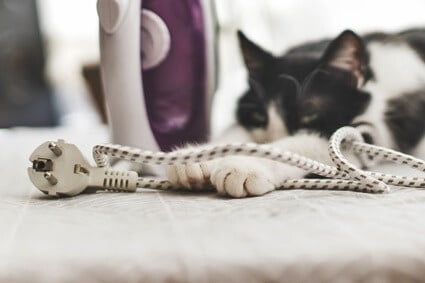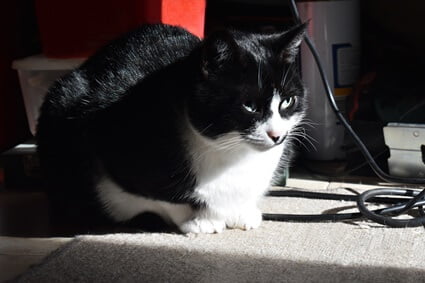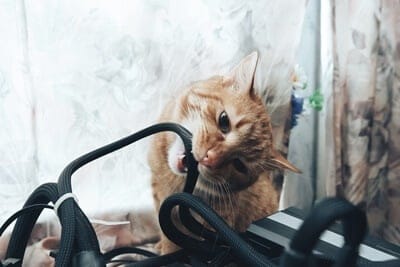Cats should never bite electrical cords, but some felines develop a problematic chewing habit. Not only can cats get electrocuted and endure painful burns, but high voltage electric shocks can result in cardiac arrest and death. If your cat chews a live cord, it could even start a house fire. It’s a dangerous habit that needs to be stopped.
To prevent cats from biting electrical cords, cover them with a PVC or rubber tube. Cats hate the smell of citrus fruits, lavender, and foods such as cayenne pepper, garlic, and mint. Create a paste and spread it on the cords, or dilute these ingredients in water and lightly spray them underneath the wires. Play with your cat more often, and provide other chew toys and accessories. Another tactic is to hide the cords so that your cat can’t reach them.
Cats chew cords out of boredom, stress, pica, OCD, and dental issues. Providing a healthy living environment and making sure that your pett’s happy can also deter your cat from biting cords.
Can Cats Get Electrocuted Chewing Cords?
As discussed, if your cat chews through a live or faulty cord, it’s at risk of electrocution. Symptoms of an electric cord bite injury include:
- Electric shock
- Difficulty breathing
- Blue tinge to the skin or gums
- Chronic cough
- Convulsions
- Crackling sounds in lungs
- Lip, tongue, or mouth burns
- Vomiting or defecating
- Increased heart rate
- Seizures
- Collapse
- Cardiac arrest
- Sudden death
The severity of the electric shock your cat receives depends on the voltage and how long the electrocution lasts. A mild shock will cause pain or discomfort, but a severe shock from a high voltage may cause cardiac arrest.
However, electrocution doesn’t always result in death. Instead, electricity that passes through the body generates an excessive amount of heat. This can damage nerves, tissue, and blood vessels. When the blood vessels become impaired, pulmonary edema occurs, which is when fluid leaks into the lungs.
Your cat’s also at risk of burns to the mouth, lips, and tongue, making it difficult for the animal to eat and drink. The affected tissues could even die, affecting your cat long-term.
My Cat Has Just Been Electrocuted, What Should I Do?
While you must do everything you can to help a cat that’s just been electrocuted, you mustn’t put yourself in danger. The current could still be circulating through your cat’s body, so turn the power off at the switch or mains before doing anything else.
When a high electrical voltage causes a shock, the cat’s likely to experience muscle spasms, causing its jaws to clamp around the cord. This can make it difficult to prise the cable from the cat’s mouth.
If you’re able to safely, you may be able to break the connection between the cord and your cat with a wooden or plastic utensil. Never use metal, as you’ll electrocute yourself and make the problem worse for your cat. Similarly, look out for any wet patches or puddles on the floor.
If you’ve broken the connection and turned off the power, wrap your cat in a towel or blanket and rush it to the vet. Alternatively, you may need to call your vet to see if they can do an emergency home visit instead.
Can Cats Die from Chewing Cords?
Sadly, if the electric shock’s powerful enough, your cat could die soon after biting through an electrical cord. However, death isn’t always instant.
As mentioned, sometimes the electrical current spreads through the body’s tissues, causing them to overheat. The damaged tissue then dies, forming painful ulcers inside the mouth and body. The ulcers can become infected, making affected cats severely ill over a few days or even weeks. If the infection gets bad enough, the cat can die from health complications.
While electric shocks aren’t commonly seen in cats, kittens are far more vulnerable and susceptible to dying from electrocution, as their bodies aren’t strong enough to withstand it. And not only are electrical cords a danger to your cat, but they’re a fire hazard in your home.
Why Do Cats Bite Cords?
You might be wondering, why do cats chew through cords? The truth is, there are several reasons for cats to bite electric cables. Your cat will have its own trigger for biting them, but some of the most likely explanations include:
Teething and Dental Health
Kittens teethe when they’re around 3-4 weeks old when the incisors and primary canines start to grow through. When this happens, the process is usually uncomfortable and sometimes even painful. Signs of teething include:
- Excessive chewing
- Appetite loss
- Sore, red gums
- Bleeding within the mouth
- Irritability
- Inability to groom
Chewing on things provides relief from the discomfort. The feeling’s satisfying for some felines, so cats will chew a cord if it’s the first thing they see. Similarly, dental disease causes cats to gnaw and chew on cables and wires to relieve pain and distract themselves from the discomfort.
Habit
Some cats chew cords out of habit. Young cats, in particular, spend a significant amount of time exploring their environment. Chewing and biting on things is a good way for them to learn and discover what’s around them, but electric cords are one of the most dangerous things they can get their teeth on.
Unfortunately, once cats get into the habit, it’s hard for them to kick it. It can also develop into OCD if you don’t put a stop to it. If this happens, the cat will begin overgrooming and self-mutilating, so allowing your cat to chew obsessively on cords can open the door to other obsessive behaviors.
Boredom
Some cats chew on cords because they’re bored and lack the mental enrichment they need. If there are no toys or games to play with, cats will create their own entertainment by nibbling on cords and chasing them around the room. Of course, cats don’t realize or understand that leads are dangerous. They just see them as something to play with.
Cats also enjoy playing with cords, believing them to be part of a fun game. Cables look very similar to string toys, so it’s easy to see where the lines become blurred.

Pica
Pica, which is a form of obsessive-compulsive disorder (OCD), is when cats chew and eat things that aren’t food. As explained by Applied Animal Behavior Science, it’s a psychological condition that’s commonly linked with younger cats. Common triggers include:
- Nutritional deficiencies
- Stress
- Territoriality
- Pregnancy
- Feline dementia
- Dental pain
- Hyperthyroidism
Cats won’t only chew and attempt to consume cords, but they’ll eat dirt and soil, fabric, plastic, string, and paper. Oriental, Burmese, Tonkinese, and Siamese cats are most prone to pica.
Stress
Cats experience a range of emotions, including stress. They crave consistency and routine, and if anything disturbs this, they can become disorientated and upset. Stress has many origins, including:
- Sudden changes to their routine
- Loneliness
- Loud noises
- Unidentified scents
- Bullying and dominance
- Inappropriate handling
The Journal of the American Veterinary Medical Association also explains how separation anxiety is a significant stress trigger. This explains why cats are more likely to bite cords when their owners aren’t around.
Stress manifests itself in several ways, and some cats will begin chewing cords to soothe themselves and relieve their stress. This can make them feel better emotionally, but fixing the issues in your cat’s environment is the best way to prevent it from chewing on dangerous cords.
Medical Issues
As cats get older and weaker, they develop a range of age-related health conditions. One such condition is hyperthyroidism, a common disease that’s caused by an increase in the production of thyroid hormones. It raises a cat’s activity levels, increasing its urge to chew.
Nutritional deficiencies also cause cats to chew on inedible things to replace the nutrients their bodies are missing.
Why Do Cats Chew on iPhone Cords?
iPhone cords are thin and flimsy, meaning it’s easy for your cat to bite through them. Also, because the wire’s so thin, it looks like a string toy. Many people use their phones while they’re plugged in to charge.
The frequent, repetitive movement of the cord is bound to pique any playful cat’s attention. As a result, it won’t be able to resist chasing after it and biting it, much like a cat killing its prey after catching it.
How to Make Your Cat Stop Biting Cords
Cord biting isn’t a habit you should allow your cat to continue. As soon as you notice your cat chewing on wires and cords, try to stop it. Learn how to prevent cats from chewing cords with the following methods:
Wrap the Cords
Knowing how to cat-proof wires is vital. One of the most effective methods of keeping electrical cords away from cats is to wrap them in a rubber cord protector or run them through PVC pipes. You can purchase these materials from any home supplies store.
Commercial products such as Chewsafe and CritterCord are also effective materials. These are clear, protective cord covers that are citrus scented to keep cats away. While cats can still bite these materials, they’re too thick for their teeth to penetrate the electrical cord. Cats are unlikely to even go near citrus products.
Similarly, you can use aluminum foil or double-sided tape to wrap the cords. Cats don’t like the feeling of these materials under their paws and in-between their teeth, so they’ll stay away from them entirely.
Make the Cords Unappealing
Using natural deterrents makes the cords smell and taste unpleasant to cats. Over time, this will help cats break the chewing habit. For example, use a scented spray to stop cats from chewing cords. Cats dislike the smell of:
- Orange
- Lemon
- Lime
- Grapefruit
- Lavender
- Geranium
- Eucalyptus
- Rosemary
- Thyme
- Rue
Dilute any of these ingredients in water and spray them near the cords. Alternatively, coat them with homemade paste or juice, as this will put cats off from chewing them – hopefully for good. Consider using hot sauce, garlic, or cayenne pepper to create your paste. Menthol ointment is also an effective deterrent.
If you’d prefer not to coat your cords, bitter apple is a viable solution. This is a non-toxic deterrent spray sold in most pet stores.
Provide Cord Alternatives
If your cat bites cords and wires because of a habit or obsessive compulsion, it will help your pet to have alternatives objects to chew on instead. Similarly, if your cat’s teething or has dental problems, it will be able to find relief without the risk of danger. Suitable items for chewing include:
- Cat grass
- Scratching posts
- Rubbery chew toys
- Cardboard boxes
- Carpet squares
Cats love chewing and playing with these kinds of toys and accessories and should quickly move on from biting electrical cords.
Increase Playtime
Cats that bite cords out of boredom benefit from increased playtime and mental enrichment. In many cases, spending more time with your cat distracts it long enough to stop chewing on cables, wires, and leads.
However, when choosing your toys, try to find some that don’t look similar to cords. String and yarn-based toys unwittingly encourage your cat to go after cords. Healthy treats are also a great way to distract your cat from leads and wires.
Hide the Cords
Hiding the cords in your house so that your cat doesn’t know they are there is a good prevention method. That’s because if the cables are out of sight, they’re out of mind.
To do so, place cabinets or large pieces of furniture in front of the cords so that cats can’t reach them. Cats can squeeze in small spaces, so try to minimize the gap as much as possible at the back.
Bunch all the cords together in a clump and tape them to the wall. Dangling cords are what cats are attracted to the most. If they’re tied up, your cat won’t even be able to get to them, let alone bit them. Doing this will also remove the fun factor.
If you have loose cords and cables lying around, put them into a drawer so that they’re completely out of the way. You only need charging devices and other leads out when they’re being used – they can be tidied away at all other times.

Improve Your Cat’s Diet
Improving your cat’s diet by adding foods rich in digestible fiber can reduce the chewing activity of cats with nutritional deficiencies. Healthy foods include:
- Cat greens
- Green beans
- Lettuce
- Peas
Cats rarely eat these foods freely, so mix them into your pet’s regular food to mask the taste and smell, enabling it to consume these essential nutrients.
If you have a long-haired cat, hairball formula diets or supplements can help uncomfortable hairballs sweep through the system instead of getting stuck. Hairballs can also drive the urge to chew on inedible objects, and cats sometimes need a helping hand getting rid of them.
Improve Your Cat’s Environment
If your cat’s biting cords because it’s stressed or worried about something in its environment, try to find the cause and remove it. For example, if you have aggressive pets, find a way to separate them from your cat. Or if you’re handling your cat too aggressively, stop cuddling your cat and wait until it approaches you.
You might not think that these things will make a difference, but removing stressors can help your cat feel more relaxed, reducing its need to self-soothe by biting cables.
My Cat Won’t Stop Chewing Cords
If you’ve tried all the prevention methods and your cat still chews through cords, it’s time to take it to the vet. That’s because your cat likely has a health condition, whether mental or physical. If so, no amount of prevention will stop your cat from biting cords.
Also, if you can’t find a way to hide them or keep them out of your cat’s reach, it will chew them while your back’s turned or when you’re away from home. This creates a fire hazard and a significant health risk to your cat.
Biting cables is a bad habit for your cat to get into. Not only does it destroy your items, but your cat’s at risk of getting seriously hurt. To stop this, divert its attention away from cables and do everything you can to hide cables away. If you leave no chance for your cat to get to them, there’s no way your cat can get hurt.

